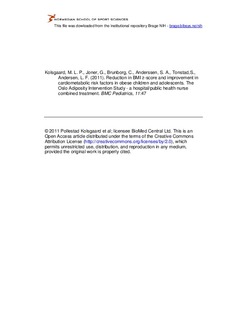Reduction in BMI z-score and improvement in cardiometabolic risk factors in obese children and adolescents. The Oslo Adiposity Intervention Study - a hospital/public health nurse combined treatment
Kolsgaard, Magnhild L Pollestad; Joner, Geir; Brunborg, Cathrine; Anderssen, Sigmund A.; Tonstad, Serena; Andersen, Lene F.
Journal article, Peer reviewed
Permanent lenke
http://hdl.handle.net/11250/170839Utgivelsesdato
2011-05-27Metadata
Vis full innførselSamlinger
- Artikler / Articles [2119]
Originalversjon
BMC Pediatrics. 2011. 11:47Sammendrag
Background:
Weight loss and increased physical fitness are established approaches to reduce cardiovascular risk factors. We studied the reduction in BMI z-score associated with improvement in cardiometabolic risk factors in overweight and obese children and adolescents treated with a combined hospital/public health nurse model. We also examined how aerobic fitness influenced the results.
Methods:
From 2004-2007, 307 overweight and obese children and adolescents aged 7-17 years were referred to an outpatient hospital pediatrics clinic and evaluated by a multidisciplinary team. Together with family members, they were counseled regarding diet and physical activity at biannual clinic visits. Visits with the public health nurse at local schools or at maternal and child health centres were scheduled between the hospital consultations. Fasting blood samples were taken at baseline and after one year, and aerobic fitness (VO2peak) was measured. In the analyses, 230 subjects completing one year of follow-up by December 2008 were divided into four groups according to changes in BMI z-score: Group 1: decrease in BMI z-score≥0.23, Group 2: decrease in BMI z-score≥0.1-< 0.23, Group 3: decrease in/stable BMI z-score≥0.0-< 0.1, Group 4: increase in BMI z-score (>0.00-0.55).
Results:
230 participants were included in the analyses (75%). Mean (SD) BMI z-score was reduced from 2.18 (0.30) to 2.05 (0.39) (p < 0.001) in the group as a whole. After adjustment for BMI z-score, waist circumference and gender, the three groups with reduced BMI z-score had a significantly greater reduction in HOMA-IR, insulin, total cholesterol, LDL cholesterol and total/HDL cholesterol ratio than the group with increased BMI z-score. Adding change in aerobic fitness to the model had little influence on the results. Even a very small reduction in BMI z-score (group 3) was associated with significantly lower insulin, total cholesterol, LDL and total/HDL cholesterol ratio. The group with the largest reduction in BMI z-score had improvements in HOMA-IR and aerobic fitness as well. An increase in BMI z-score was associated with worsening of C-peptide and total/HDL cholesterol ratio.
Conclusions:
Even a modest reduction in BMI z-score after one year of combined hospital/and public health nurse intervention was associated with improvement in several cardiovascular risk factors.
Beskrivelse
© 2011 Pollestad Kolsgaard et al; licensee BioMed Central Ltd.
